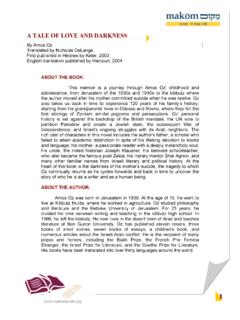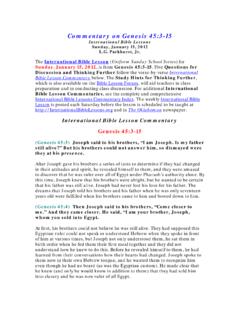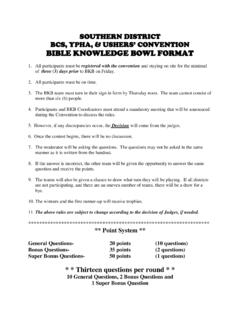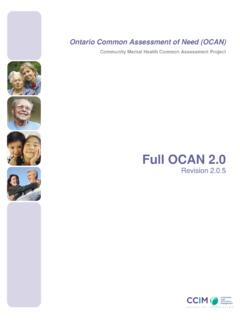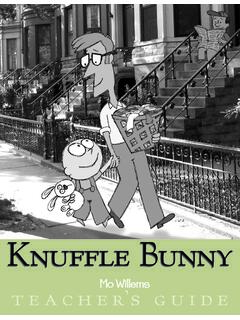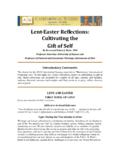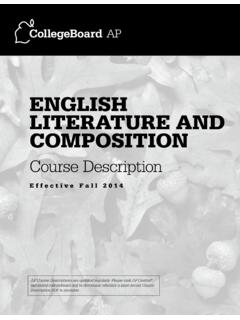Transcription of Discussion questions for The Three Pines Mysteries, by ...
1 Discussion questions for The Three Pines Mysteries, by Louise Penny 1. How important is the use of humor in this book? 2. Which Three Pines villager would you most like to have cafe au lait with at the bistro? 3. Why is Ruth a villager? 4 Louise Penny says her books are about murder, but at their heart they're about other things. What else is this book about? What are some other themes? 5. Agent Nichol is an extremely controversial character in the books. What do you think of her? What purpose does she serve? Reading Group questions for THE BRUTAL TELLING 1. A theme in this book, and many of Louise's books, is the difference between "truth" and "opinion." Is it always important to tell the truth, no matter how brutal it may be? 2. Was Olivier really wrong to give Madame Poirier less money for her furniture than he knew it was worth? Isn't that what we all hope we'll find at antique shops or flea markets? A treasure?
2 Would you do differently? 3. When Superintendent Therese Brunel asks Clara what she fears, she says, "I m afraid of not recognizing Paradise." Therese responds, "So am I." Why do you think they are both worrying about this, and can you connect such concerns to your own life? 4. How do you view the various assertions that Vincent Gilbert is a saint, especially when Gamache points out that "most saints were martyrs, and they took a lot of people down with them"? How would you feel about living with a saint? 5. For a moment Gamache himself feels the tug of greed and would love to slip one of the first editions into his pocket. What do you think of Gamache at that moment? Does it remind you of any temptations you yourself have faced?" 6. In the book Brunel and Gamache discuss where the finest example of a Haida totem pole is standing. Where is that, and what is the irony? 7. What was the final monster? The thing even the Mountain ran from, and that kept the Hermit hiding in his cabin?
3 How do you think this applies to the various characters in the book? 8. Ruth puts Rosa into clothing. Why? 9. Was the Hermit happy, finally? Had he found peace? Could you live in the Hermit's cabin? 10. In the book Gamache quotes Thoreau s Walden: "I had Three chairs in my house. One for solitude, two for friendship, Three for society." How many chairs would you have in your house? 11. What is the role of storytelling throughout the novel? What about poetry and other forms of art, from painting to sculpture and totem poles? 12. If Three Pines existed, would you move there? How do you think the community will weather the events of this story? Discussion questions for The Cruelest Month 1. We re told that Three Pines is only ever found by people lost. In what way are Peter and Clara, Ruth, Myrna, Gabri and Olivier, and even Gamache and his team of investigators, lost people? 2. Early in the story, when Peter is looking at Clara s unfinished painting: He suddenly felt something grab him.
4 From behind. It reached forward and right into came to his eyes as he was overcome by this wraith that had threatened all his life. That he d hidden from as a child, that he d run from and buried and denied. It had stalked him and finally found him. Here, in his beloved wife s studio. Standing in front of this creation of hers the terrible monster had found him. And devoured him. What do you think Peter s monster is? How does it manifest itself throughout the story? What becomes of the monster in the end? 3. Peter, Ruth and Olivier stay behind when the group heads to the Hadley house for the s ance. Discuss these characters and their various reasons for avoiding the house and/or the ritual. 4. What do you think is the difference between magic and miracles? 5. How does the novel's epigraph, from T. S. Eliot's poem "The Waste Land," resonate with the story? What do you think of Peter s interpretation of April s cruelty: All those spring flowers slaughtered.
5 Happens almost every year. They re tricked into blooming, into coming out. Opening up. And not just the spring bulbs, but the bulbs on the out and happy. And then boom, a freak snowstorm kills them all. 6. As the plot proceeds, is it possible to guess or deduce the killer? If so, at what point, and on what grounds? 7. Louise Penny is unusually sensitive to the difficulties of finding love and the struggle to champion it in a harsh world. In The Cruelest Month, the relationships between Odile and Gilles, Hazel and Madeleine, and Clara and Peter, are very different. What does each relationship say about love? Are there any common elements shared by all? 8. How does Gamache s trusting nature, seen by many as his greatest failing, ultimately serve him? 9. How bitter a thing it is to look into happiness through another man s eyes, wrote Shakespeare in As You Like It. Discuss the various manifestations of jealousy in The Cruelest Month.
6 What makes Gamache so much happier than his seemingly more fortunate best friend, Br beuf? Discussion questions for A Fatal Grace 1. In the golden age of classic murder mysteries, the Detection Club, whose founders included Dorothy L. Sayers and Agatha Christie, drew up a list of rules for crime fiction that included the following: No clue that is important to the solution of the puzzle may be concealed from the reader. What are the clues to the murders in A Fatal Grace, and how does Louise Penny hide them in plain sight? 2. Consider the lines (from A Sad Child, by Margaret Atwood ): Well, all children are sad/but some get over it. A number of the people in the novel have had damaging childhoods. What helps or hinders them in moving beyond those childhoods? 3. Discuss the different meanings in the book of Be Calm (and B KLM). 4. Beauvoir regards Gamache as having saved him. Is Gamache trying to do the same for Nichol, and what do you think his chances are for success?
7 What do you think it takes to get on what Beauvoir calls Gamache s legendary, albeit well hidden, bad side ? 5. Why does Gamache laugh with joy when Ruth Zardo says that CC de Poitiers wasn t very good, but she wasn t so bad either. I mean isn t cruel and selfish? Do you think Gamache agrees with this idea? Do you agree? 6. Three Pines is described as enchanted and magical, a fairy-tale world but it s also a world where Dr. Frankenstein creates a monster. How do you view the village and the people who live there? 7. Clara says, At two in the afternoon my art is brilliant, at two in the morning it s crap. Peter doesn t understand her art, but Gamache calls it marvelous. What do you think this says about her art and about her marriage? Why does Gamache tell Clara that she has an instinct for crime ? 8. What impression do you get of Reine-Marie from her relatively brief appearances in the story? What do you think of her marriage to Gamache?
8 9. Both Clara and Gamache believe they see God in the course of this story. How do you view their experiences (and why lemon meringue pie)? Discussion questions for Still Life 1. At the beginning of Still Life, we are told that violent death still surprised Chief Inspector Armand Gamache. Why is that odd for a homicide detective, and how does it influence his work? What are his strengths and his weaknesses? 2. The village of Three Pines is not on any map, and when Gamache and Agent Nicole first arrive there, they see the inevitable paradox. An old stone mill sat beside a pond, the mid morning sun warming its fieldstones. Around it the maples and birches and wild cherry trees held their fragile leaves, like thousands of happy hands waving to them on arrival. And police cars. The snakes in Eden. Can you find other echoes of Paradise in Three Pines , and what role do snakes real or metaphorical play there? 3. There are Three main couples in the book: Clara and Peter, Olivier and Gabri, and Gamache and Reine-Marie.
9 How would you characterize each of these relationships? 4. Gamache says I ve never met anyone uniformly kind and good, yet no one has anything bad to say about Jane except regarding her art. What is your impression of that art? How do you understand the game Jane used to play with Yolande and the Queen of Hearts? 5. When the charred arrowhead is found in his home, it is said that Matthew Croft had finally been hurt beyond poetry. How does poetry help him and other characters in this novel? Does it ever have the power to hurt? What do you think of Timmer Hadley s idea that there s something about Ruth Zardo, something bitter, that resents happiness in others, and needs to ruin it. That s probably what makes her a great poet, she knows what it is to suffer. 6. Consider Gamache s advice to Nichol: Life is choice. All day, everyday. Who we talk to, where we sit, what we say, how we say it. And our lives become defined by our choices.
10 It s as simple and as complex as that. And as powerful. Similarly, Myrna stopped practicing psychology because she lost patience with people who lead still lives, waiting for someone to save fault lies with us, and only us. It s not fate, not genetics, not bad luck, and it s definitely not Mom and Dad. Ultimately it s us and our choices. How do their choices affect the principal characters in the novel? Do any of their choices remind you of ones you have made in your own life? 7. There s a huge clue to the murder early in the book, when Jane gives Ben a meaningful look and then quotes from W. H. Auden: Evil is unspectacular and always human, and shares our bed and eats at our own table. Why is it so easy to overlook that clue at the time, and what impact does it have when it s quoted again in the last chapter? 8. Who do you think Gamache has in mind when he tells Gabri and Olivier: You re not the types to do murder.

